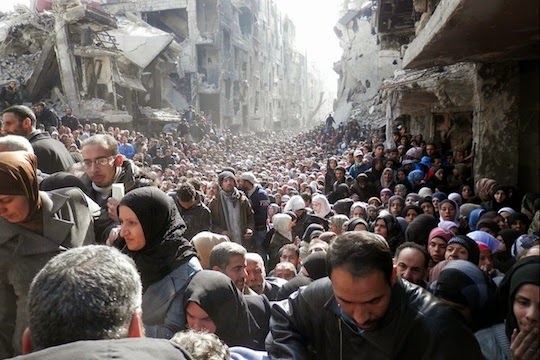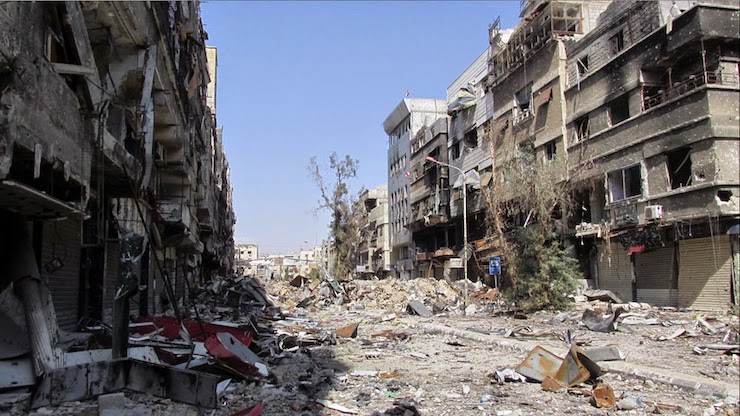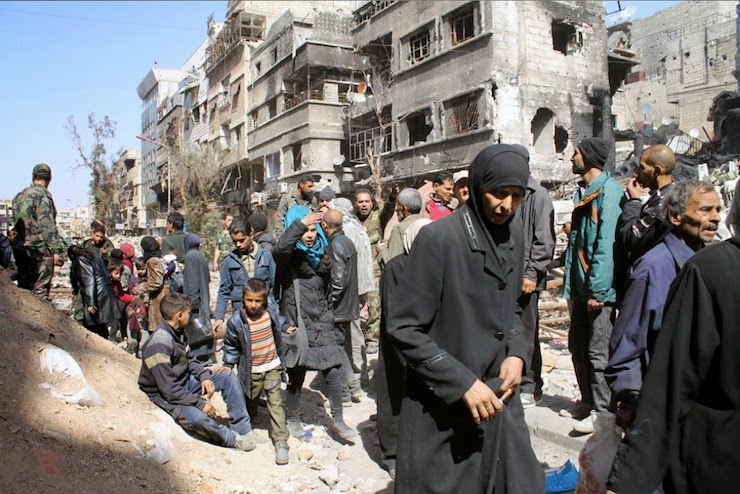The videos (below) are heart breaking. The Palestinians in Yarmouk are besieged on all sides – by the butchers of ISIS and Al Nusra, ably supported by Israel, and bombed from the air by Assad.
Tony Greenstein
As Palestinians are being murdered and starving to death
in the refugee camp near Damascus, the Arab world is busy intervening in Yemen,
the Palestinian Authority is silent, and Israeli television is talking about
where to eat during the Passover holiday.
in the refugee camp near Damascus, the Arab world is busy intervening in Yemen,
the Palestinian Authority is silent, and Israeli television is talking about
where to eat during the Passover holiday.
By Samah Salaime Egbariya
 |
| Yarmouk residents gathered to await a food distribution from UNRWA in January 2014. (Photo by UNRWA) |
Monday morning, on the morning show on Israel’s Channel
10, which was co-hosted by the station’s military correspondent because the
regular hosts are on vacation, they were supposedly discussing recommendations
for the Israeli holiday traveler. After describing Israelis on vacation as ugly
and litterers and more, the hosts recommended places to see and good places to
eat.
10, which was co-hosted by the station’s military correspondent because the
regular hosts are on vacation, they were supposedly discussing recommendations
for the Israeli holiday traveler. After describing Israelis on vacation as ugly
and litterers and more, the hosts recommended places to see and good places to
eat.
As one might expect, most of the restaurants their guest
culinary experts recommended represented the Arab kitchen. They went from Acre
to the Galilee to Tiberias, and then Or Heller, the military correspondent,
asked the two guest chefs for recommendations of places to eat in the Golan
Heights. One of chefs, Haim Cohen, thought for a second and then answered,
“Syria. But’s a little difficult [to get there],” adding that “the Syrian
kitchen is excellent!”
culinary experts recommended represented the Arab kitchen. They went from Acre
to the Galilee to Tiberias, and then Or Heller, the military correspondent,
asked the two guest chefs for recommendations of places to eat in the Golan
Heights. One of chefs, Haim Cohen, thought for a second and then answered,
“Syria. But’s a little difficult [to get there],” adding that “the Syrian
kitchen is excellent!”
The host, Or Heller, kept the jokes coming. “Yes, in the
Yarmouk Camp … well ISIS are the only ones eating there.” Making fun at the
expense my people in the camp that has been under siege for three years really
got to me. I got up and went to the kitchen without changing the channel and
listened to the rest of the program from afar. And then, another half-joke
comes out of the television set, this time as part of their map of holiday
traffic jams, about what icon Waze should have to indicate where ISIS is in the
Yarmouk Refugee Camp. I couldn’t get over the anger and the pain, and wasn’t
able to continue by daily routine.
Yarmouk Camp … well ISIS are the only ones eating there.” Making fun at the
expense my people in the camp that has been under siege for three years really
got to me. I got up and went to the kitchen without changing the channel and
listened to the rest of the program from afar. And then, another half-joke
comes out of the television set, this time as part of their map of holiday
traffic jams, about what icon Waze should have to indicate where ISIS is in the
Yarmouk Refugee Camp. I couldn’t get over the anger and the pain, and wasn’t
able to continue by daily routine.
People don’t understand just how bad the situation is in
the Palestinian refugee camp in Syria. Tens of thousands of Palestinians,
famished and under attack, are sitting prey for a group of
fighters/rebels/terrorists/Assad supporters. We, the Palestinians, and the
entire world, don’t really know who’s against who or what they are guilty of.
There have been more and more reports of bodies, horrifying murders and wounded
in recent days.
the Palestinian refugee camp in Syria. Tens of thousands of Palestinians,
famished and under attack, are sitting prey for a group of
fighters/rebels/terrorists/Assad supporters. We, the Palestinians, and the
entire world, don’t really know who’s against who or what they are guilty of.
There have been more and more reports of bodies, horrifying murders and wounded
in recent days.
 |
| ‘Yarmouk is devastated throughout, with street storefronts and houses suffering the brunt of the physical damage,’ January 2014. (Photo by UNRWA) |
When the war in Syria began three years ago, we, the
Palestinians here in Israel, were angry at them, with utmost
self-righteousness, that they didn’t join the revolution against Assad. Later
we understood their immense fear of getting mixed up in it. The reports we’ve
gotten in the past three years about what the Assad government has done to Palestinian
youngsters in the refugee camp are simply horrible. Later we got mad at
al-Nusra Front, which entered the camp as an opposition force to the regime and
were angry that the organization was terrifyingly executing people on the
streets. Its fighters raped young women and committed other crimes against
humanity that are documented and available for anyone to see on the Internet.
Palestinians here in Israel, were angry at them, with utmost
self-righteousness, that they didn’t join the revolution against Assad. Later
we understood their immense fear of getting mixed up in it. The reports we’ve
gotten in the past three years about what the Assad government has done to Palestinian
youngsters in the refugee camp are simply horrible. Later we got mad at
al-Nusra Front, which entered the camp as an opposition force to the regime and
were angry that the organization was terrifyingly executing people on the
streets. Its fighters raped young women and committed other crimes against
humanity that are documented and available for anyone to see on the Internet.
And now, news that ISIS united with al-Nusra Front
against the poor Palestinians in the Yarmouk Refugee Camp, for reasons that
aren’t entirely clear — aside from al-Nusra’s fear that it was losing control
of the camp, and joined ISIS to defeat a group of Palestinian youngsters who
organized themselves in an attempt to defend the camp. They call themselves
“Aknef Beit al-Maqdis” (The Environs of Jerusalem, in Arabic).
against the poor Palestinians in the Yarmouk Refugee Camp, for reasons that
aren’t entirely clear — aside from al-Nusra’s fear that it was losing control
of the camp, and joined ISIS to defeat a group of Palestinian youngsters who
organized themselves in an attempt to defend the camp. They call themselves
“Aknef Beit al-Maqdis” (The Environs of Jerusalem, in Arabic).
 |
| Gathered on Yarmouk Street, residents begin hurrying to reach the distribution point, January 2014. (Photo by UNRWA) |
Refugees who fled for their lives to every corner of the
world from Yarmouk have described the terror and the smell of death that
permeates the camp. “People are eating each other out of starvation,” somebody
wrote. There has been no running water since September, and the world is
silent.
world from Yarmouk have described the terror and the smell of death that
permeates the camp. “People are eating each other out of starvation,” somebody
wrote. There has been no running water since September, and the world is
silent.
Palestinians the world over search for snippets of
information about their relatives in the camp and, over and over again, see
photos of funerals, and that video, in which a boy who hasn’t seen a slice of
bread for months tears your heart open with his tears. The descriptions and the
photographs that make it out are reminiscent of the eternal photos of
concentration camps, or of ethnically cleansed villages in Bosnia.
information about their relatives in the camp and, over and over again, see
photos of funerals, and that video, in which a boy who hasn’t seen a slice of
bread for months tears your heart open with his tears. The descriptions and the
photographs that make it out are reminiscent of the eternal photos of
concentration camps, or of ethnically cleansed villages in Bosnia.
For we Palestinians who are outside the walls of the
Yarmouk refugee camp, our utter and complete helplessness is unbearable. Even
organizing a small demonstration in Haifa over the weekend was emotionally
trying for the activists, who came with overwhelming despondency, anger and
sadness — about the entire world that is simply ignoring what’s happening,
about the Arab world that managed to organize a special military force in Yemen
overnight, about the silence of the Palestinian Authority, and about the
impotence of the international community.
Yarmouk refugee camp, our utter and complete helplessness is unbearable. Even
organizing a small demonstration in Haifa over the weekend was emotionally
trying for the activists, who came with overwhelming despondency, anger and
sadness — about the entire world that is simply ignoring what’s happening,
about the Arab world that managed to organize a special military force in Yemen
overnight, about the silence of the Palestinian Authority, and about the
impotence of the international community.
I know that my anger toward the Israeli television
presenter who tried to make jokes about my kin in Yarmouk is actually anger
about the entire situation. It is anger at the irrationality of it all, the
injustice, and the war that is crushing thousands of people — and that nobody
cares. It’s a shame. It’s a shame that there isn’t any oil or natural gas under
that refugee camp. If there were, I’m sure that an alliance of freedom-seeking
nations would quickly come together — with the backing of the UN, of course —
to save all those innocent people.
presenter who tried to make jokes about my kin in Yarmouk is actually anger
about the entire situation. It is anger at the irrationality of it all, the
injustice, and the war that is crushing thousands of people — and that nobody
cares. It’s a shame. It’s a shame that there isn’t any oil or natural gas under
that refugee camp. If there were, I’m sure that an alliance of freedom-seeking
nations would quickly come together — with the backing of the UN, of course —
to save all those innocent people.
Samah Salaime Egbariya is a social worker, a director of
AWC (Arab Women in the Center) in Lod/Lyd and a graduate of the Mandel
Leadership Institute in Jerusalem. She is a blogger for
our Hebrew-language sister-site, Local Call, where this article was first
published. Read it in Hebrew here.
AWC (Arab Women in the Center) in Lod/Lyd and a graduate of the Mandel
Leadership Institute in Jerusalem. She is a blogger for
our Hebrew-language sister-site, Local Call, where this article was first
published. Read it in Hebrew here.
Posted in Blog
